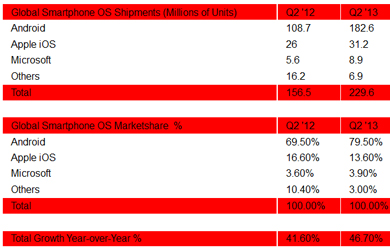News
Windows Phone Sees Market Uptick
Year-over-year, Windows Phone device sales increased by 3.3 million.
Windows Phone appears to be making slow, but steady, headway in the smartphone race.
Even with that good news, it still trails the market leaders -- Google and Apple -- by huge margins.
Windows Phone's global market share reached 3.9 percent for the second quarter of 2013, according to analyst firm Strategy Analytics' report. That's only fractionally higher than its 3.6 percent market share from the year-ago quarter, and still far behind the Google Android and Apple iOS mobile operating systems. However, Windows Phone's Q2 2013 market share puts it at "its highest level in the global smartphone market for three years," Strategy Analytics said.
A total of 8.9 million devices running Windows Phone shipped worldwide during Q2 2013, a 3.3 million increase from the year-ago period.
Microsoft's smartphone platform may have reached the No. 3 slot as early as Q1 of this year, at least according to an earlier report from research firm IDC, which put Windows Phone slightly ahead of the BlackBerry OS for that period. However, a separate Q1 report from Gartner Research put Windows Phone slightly behind the BlackBerry OS, in fourth place.
Strategy Analytics' Q2 2013 report does not break out the market share for the BlackBerry OS, but it does put Microsoft firmly in the lead of "other" platforms, which combined for just 3 percent market share for the quarter. That's down significantly from 10.4 percent in the year-ago period.
 Source: Strategy Analytics
Source: Strategy Analytics
"Microsoft is making steady progress in the smartphone market due to strong support from Nokia," said Linda Sui, an analyst at Strategy Analytics, in a prepared statement. "However, we believe Microsoft's WP8 platform still needs to improve in at least two areas before it truly takes off. First, the license fee charged to smartphone makers for WP8 must be more competitive to compete with Android in lower price-bands. And second, Microsoft must dramatically accelerate its support for advanced technologies, such as octo-core chipsets, because WP8 continues to lag behind Android in the premium smartphone category."
Leading Microsoft by double-digit margins are Android and iOS, at No. 1 and No. 2, respectively. Apple's platform shipped on 31 million units worldwide and owned 13.6 percent of the market in Q2 2013.
Meanwhile, Android shipped on over 182 million units worldwide and owned nearly 80 percent of the market -- a "record," according to Strategy Analytics, which noted that Android now runs on roughly eight out of every 10 smartphones shipped.
"Competitive licensing costs, numerous hardware partners and a large apps store continue to be among the main drivers of Android's success," said Strategy Analytics Executive Director Neil Mawston.
High demand for Android devices propelled total smartphone shipments by almost 50 percent over the year-ago quarter, Strategy Analytics said. Nearly 230 million smartphone devices shipped worldwide in Q2 2013, compared to 157 million devices in the same period last year.